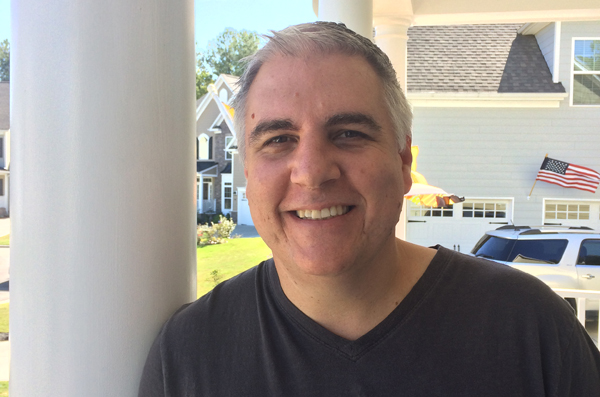
Amie Whittemore by Rich Tarbell
April is National Poetry Month, and a few weeks ago, this column was going to be chock-full of local events. The coronavirus has, of course, changed all that. In lieu of promoting events, I’ve asked a few local poets to share what’s on their minds these days regarding reading, writing and poetry.
These same poets, plus yours truly, are scheduled for an event called “Why We Love Poetry” at Linebaugh Library on Tuesday, April 7, at 7 p.m. However, this event and others will most likely be postponed or changed to an online format. Check online for the latest details on local area poetry and literature events. Poetry in the Boro will be trying to share schedule changes of all events as we learn them.
Amie Whittemore: “How can you move with, rather than against, the changes ahead?”
Amie is the 2020 Murfreesboro Poet Laureate and author of Glass Harvest from Autumn House Press.
Honestly, as our lives tilt toward a new horizon during this pandemic, it has been hard for me to focus on the writing of poetry. I have done a bit of reading and it has been nice to get lost in the beautiful structures of poems, these temples of glass, that feel strangely antiquated now, talking to me from a different though familiar universe. That said, I do think there is a guide from literature for us to follow: the indomitable Octavia Butler. Her novel Parable of the Sower, published in 1993 and tracking the transformation of society in the 2020s, is eerily prescient. Her narrator, Lauren, opens the book with these words:
“Prodigy is, at its essence, adaptability and persistent, positive obsession. Without persistence, what remains is an enthusiasm of the moment. Without adaptability, what remains may be channeled into destructive fanaticism. Without positive obsession, there is nothing at all.”
Adaptability, persistence, positive obsession: these are true guides right now: how can you move with, rather than against, the changes ahead? How can you persist? How can you root yourself, into a hobby or skill or craft, some positive obsession, that will help you during this time—and, thus, help others? Maybe it’s poetry; but it might also be art, gardening, sewing, singing, knitting, baking, crafting community from isolation—there are so many possibilities. Find yours; become positively obsessed with it as you ride out this season of change.
___

Mike James: “If it scares you, keep going.”
Mike is the author of 15 poetry collections, most recently Journeyman’s Suitcase, released this year by Luchador Press.
Poetry can be entertainment and escapism. Homer and Virgil provided both thousands of years ago. Then, along came Shakespeare, who did the same thing. Poetry doesn’t have to be about today’s world. Many of us spend hours each day worrying about health and family, work and society. Good poetry should be able to take a reader away from the world outside her window in the same way that Isaac Asimov can teleport us into a future we haven’t gotten around to making yet.
The worst advice any young poet can get is “write what you know.” Most of us don’t know much and most of what we do know is boring stuff like how to fry an egg or how to lace shoelaces. A better piece of advice might be “don’t be afraid to fail” or “if it scares you, keep going.” The wonderful Arkansas poet Miller Williams once told me that a poem should do two things, and one of those is be interesting. He never told me what the other one was.
___

Gary McDowell: “Tell me your skin doesn’t light up, your mood doesn’t transport . . . ”
Gary is the author of six poetry collections, most recently Mysteries in a World That Thinks There Are None from Burnside Review Press, and the forthcoming Aflame, winner of the 2019 White Pine Press Poetry Prize.
Are you tired of singing “Happy Birthday” or the alphabet song while you wash your hands for the CDC-recommended 20 seconds? How about memorizing and reciting a poem instead? My favorite short poem ever—perhaps even shorter than 20 seconds, but you can repeat it twice, if needed—is “Northern Wisconsin” by Maurice Kilwein Guevara from his book Autobiography of So-and-so: Poems in Prose. Maybe it’s because of my absolute affinity for the North Woods, or perhaps because loons are one of my favorite animals, or maybe it’s just how damn sensuous it is. Feel the p’s and the o’s as they fumble to your tongue and tell me your skin doesn’t light up, your mood doesn’t transport to a simpler place, a place lit with stars and smiles, firepits and walleyes on the end of a fishing line. Either way, here it is in its entirety—and yes, it is a prose poem and so features no lineation:
“I’d love to put the tip of my tongue there, on that copper synapse, inside the long nape of the loon, just before she disappears.”
Gary concludes, “Hold one another tight, and let poetry be the thing that ties us together.”
___
“Happy the Man” was written by the Roman poet Horace over 2,000 years ago. From Odes, Book III, xxix. Translation by John Dryden. Public domain.
Happy the Man
Happy the man, and happy he alone,
He who can call today his own:
He who, secure within, can say,
Tomorrow do thy worst, for I have lived today.
Be fair or foul or rain or shine
The joys I have possessed, in spite of fate, are mine.
Not Heaven itself upon the past has power,
But what has been, has been, and I have had my hour.
___
I say, to paraphrase Horace: For all its strangeness, claim every small joy, and call today your own.
___
Some other pandemic-related poems:
Six Feet Away
By Steve Morley
Six feet under, or six feet away
Not much of a choice, when they put it that way
Ambition is lacking, except for more snacking
And so far the sofa’s the safe place to stay
Some crazies are carving an underground cave
Some wander to Walmart, but I’m not that brave
Hey, don’t diss the distance—we still have assistance
The arm of the Lord is not too short to save
This state of containment killed live entertainment
And current projections are shaky
You can still catch a virus from Billy Ray Cyrus
Though it’s only his heart that feels achy
Six feet away, or six feet of dirt
I’m learning to sneeze in the sleeve of my shirt
My arm’s as infectious as two-thirds of Texas
And my wardrobe has sent out an urgent alert
I’m self-quarantining—what else can you do?
There’s no flying the coop when they’re cooping the flu
The extent of the change is substantially strange
When the knock-knock jokes end with “It’s nobody WHO?”
From door-to-door bidness to Jehovah’s Witness
Such visitors no longer flank you
But I’ve been so sequestered, I’d gladly be pestered
I could use practice saying “no thank you”
Six feet under, or six feet away
This virtual poker ain’t much fun to play
But I’m not a gambler, so I won’t be a rambler
And until further notice I’ll pray
That we all won’t continue to stay
Here and hug-less at six feet away
___
History Will Remember
by Donna Ashworth
History will remember when the world stopped
And the flights stayed on the ground
And the cars parked in the street
And the trains didn’t run.
History will remember when the schools closed
and the children stayed indoors
And the medical staff walked towards the fire
And they didn’t run.
History will remember when the people sang
On their balconies, in isolation
But so very much together
In courage and song.
History will remember when the people fought
for their old and their weak
Protected the vulnerable
By doing nothing at all.
History will remember when the virus left
And the houses opened
And the people came out
And hugged and kissed
And started again.
Kinder than before.














Love that six feet away poem. Very nice 💕
Comment May 2, 2020 @ 4:25 pm